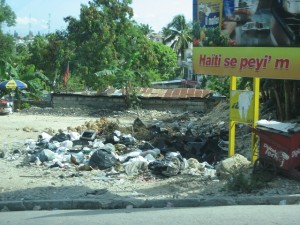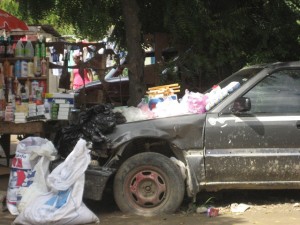Haiti is fascinating; an endlessly interesting place about which to research and write. The challenge though, as in so many things, is to report with reasonable balance. Sharing good news and bad, resisting the urge to shine and sugar-coat or conversely, to paint a bleak picture in gloomy shades of black and blacker.
That having been said, the story of a company called SRS Haiti is one that can be told in balance. SRS stands for Sustainable Recycling Solutions, the brain-child of Andrew MacCalla and Brett Williams, who got together with Mike Shinoda of the rock band Linkin Park, and Louis Blanchard, President and CEO of Haiti’s leading drinking water company to clean up the streets of Port-au-Prince under a for-profit business model of collecting plastic waste. Their idea was to create a social business with a goal of establishing a lasting recycling industry in Haiti. They set out to provide job opportunities to Haitians and help protect the environment by cleaning up the streets. In 2012, the dream became a reality. SRS opened for business and, in a society that depends largely on word-of-mouth communication, their collection enterprise soared immediately into the stratosphere.
But the blessing of SRS’s meteoric popularity quickly became a problem. Every person who brought in plastic needed to be paid for it, and as it became more well-known, the company simply couldn’t keep up the pay-out. Specifically, in its first month of operation, SRS received more than seven times the amount of plastic it had originally projected. After six months, SRS was completely swamped and had to shut the doors, under the very real threat of having to close down completely.
While the company was dangerously close to the edge, it didn’t fall over into the abyss. SRS leadership put together business and marketing
strategies which they presented to the Clinton Foundation in February of this year. SRS was awarded a grant of $250,000 which has enabled the company to form partnerships and develop a market for their cleaned, sorted plastic for production of consumer goods. Since that infusion of funding, the future for the company and for Haiti, looks very promising.
According to the SRS website, collectors in Port-au-Prince have removed 4.5 million pounds of plastic from their streets. Let’s say that the average 16 oz. plastic bottle weighs half an ounce. (The actual weight varies from approximately .495 to .661 oz.) So some quick rough math reveals that the equivalent of 144 million 16 oz. plastic water bottles have been cleared from the streets and waterways of Port-au-Prince. Also, according to their website, SRS has paid out a little over half a million dollars to those collectors. More quick math, that is approximately equal to 12 cents/pound. Admittedly, that doesn’t sound like a whole lot and in all honesty, it gives me pause, knowing that the price per pound elsewhere is MUCH higher. That could be apples and oranges, though. For now, let’s go with the fact that it IS payout, it IS sustainable, and it IS making a hugely positive environmental impact.
Co-founder Mike Shinoda initially was a something of a silent entity, but he has recently stepped out of the shadows to bring more visibility to the enterprise. Clothing manufacturer Eco Wear has partnered with SRS to buy plastic bottles to create a variety of consumer products, including merchandise for Linkin Park. That’s the fun and “sexy” aspect of the business. More importantly, though somewhat less flashy, Giant Dragon has also become a major trading partner. With recycling operations in Hong Kong and the Dominican Republic, it announced that it has committed to purchasing a minimum of 4 million pounds of SRS plastic over the next year. To learn more about SRS and its operations, click here: http://www.youtube.com/watch?v=INPIIidauok
Four million pounds of plastic off the streets and out of waterways next year. No need to sugar coat that. That’s terrific!
Contributed by Linda for Beyond Borders/It’s Cactus


